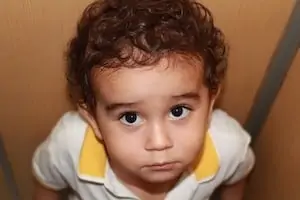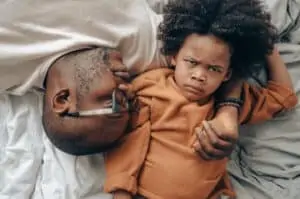When I spanked my daughter for the first time, I felt awful. Even though I was spanked as a child. But spankings were rare for me, reserved for truly abominable behavior.
I mentioned that in my last post.
But if I hit my child and feel guilty, what can I do about it? That’s what I’m hearing from lots of mamas out there. Indeed, we’re in ultra-stressful times now. A friend called me crying a few weeks ago because she swore to me, “I spanked my toddler too hard.”
“When spanking my son, he started crying and crying as I’ve never heard before,” she told me. So many of you want to know the answer to the age-old dilemma: I spanked my child…now what?
Yes, you can spank or hit your child too hard. But how do you know if you did, in fact, spank them too hard or if they’re just crying because of the punishment?
Luckily for my friend, she had an appointment with the pediatrician that same week. He pronounced her son healthy as a horse. He didn’t have any bruises or anything like that, another sign that her spanking wasn’t physically harmful.
Even though I was raised in the era of spanking, just as many of you are, I, too, have felt guilty for spanking my children. Today, I will get into all that and answer your burning questions. I’ve also got other ways to handle things and how to manage your guilt for punishing your children (even if no spanking is involved) so keep reading!
Why do I feel guilty when I discipline my child?
I’ll answer this question with a question of my own. Who wants to feel like the bad guy? No one! But you can’t just ignore it when your children do bad things. Kids are experts at learning how to manipulate parents and grandparents too.
My eldest LOVES to point out when I’ve done something wrong and when correcting her behavior. I swear she must have a journal of this. “Well, YOU ate a cookie before dinner that one time 3 months ago.” Honest to goodness!
My youngest, meanwhile, will use tears to try to manipulate us.

The other day, she was jumping on the couch in the living room. I’ve told her not to do this. We had a big talk one day because we have hard tile floors. While we have area rugs, they’re not going to do much to help her if she falls off and hits her head.
I told her I didn’t want her to get hurt and said furniture isn’t for jumping on beyond that. She promised she wouldn’t do it again. Yet, I found her doing exactly the opposite days later. So I told her I would take her tablet away as that’s what I’d warned her about the other day (and had told her taking her tablet for a week would be the punishment).
Naturally, she turned on the waterworks. And naturally, I felt awful about it.
But I had to remind myself that discipline isn’t about parents. It’s about our kids and helping them grow into responsible, healthy, and ethical adults.
This is going to take some time to let go of this guilt. If you’re worried about hurting your child, then that is a genuine concern. Perhaps finding new ways to discipline your son or daughter will help you feel less guilty. At the end of this post, I’ll give you some tips that don’t involve spanking or hitting to help you get the desired results without feeling like a monster.
And just in case you need to hear this, you are not a monster!
What are the consequences of hitting a child?
While I turned out just fine, and so have many others in my generation, there is quite a bit of research showing spanking and hitting as forms of discipline are very dangerous to parents.
According to the American Psychological Association, studies reveal that physical punishment can cause children bodily injury and mental health issues. It can also lead to aggression and antisocial behavior. This research shows spanking doesn’t work, though many parents still spank their kids.
I wrote about corporal punishment in great detail in my last article, so check it out. But basically, the gist is that spanking is starting to fade away. Are you a bad parent if you spank your child on occasion? I don’t think so in the slightest. But you will need a new bag of tricks as they get older.
I can tell you from first-hand experience that you cannot get a child of 8 or older to lay across your lap for a spanking. You need not be afraid to discipline your children, but updating your methods will help you have a more harmonious household.
Can you over-discipline a child?
When I discussed corporal punishment in my other recent post, you probably had an inkling that you can over-discipline your child. But children need the discipline to know how they should behave.
What’s interesting, though, is that so many people equate discipline to punishment. They’re not the same, though. You have to build the framework to teach them what is and isn’t appropriate in certain settings.
Over-disciplining a child, is almost as bad as not being disciplined enough. A child without enough discipline and structure feels insecure and lost, while as the parent, you’ll feel like you have no control. Over-disciplining negatively without enough praise and reward will have your child behaving well out of fear, affecting them later in life with self-esteem and anxiety.
To work, discipline should be firm yet fair. You will need to set limits and rules. You’ll also need consequences for broken rules. And naturally, you’d be right to assume that these things will evolve with age. You can’t expect your 6-year-old child to follow the same rules as your teenager or have the same consequences. As you all grow and change over the years, this stuff needs to be reviewed together as a family.
With babies, they test things as they develop. Everything is new and exciting to a baby. So if your baby tugs on her dad’s mustache and finds this funny, she likely likes his reaction. But she won’t understand the consequences or right from wrong. So you can’t dole out consequences to a baby.
Instead, a baby will learn if you tell them ‘no’ and show them how they can nicely pat Daddy’s mustache. You’ll have to do this before they get the message.
Then some toddlers have frustration and anger explosions. They’re developing new skills and learning how to be more independent all at the same time. Timeouts work best for toddlers but keep them short because of their attention span. Loving teaching about what is a good way to show emotions vs. what isn’t going a long way.
Ah, but then your child gets to preschool age, and she really starts to understand good behavior and what is acceptable. As she learns about consequences, you can help her by setting boundaries. Be clear about your expectations and prepare to issue a clear consequence for undesirable behavior.
Once your child is of school age, they will know how they should behave. But that doesn’t mean you won’t have trouble. This is where you should sit down and make rules as a family. Have your kids suggest what they think is acceptable and what isn’t. Come together and agree on the terms and consequences. This way, should the rules be broken, your child knows exactly what to expect and will accept the consequences.
How to handle your anger at your child?
It is perfectly natural and normal to get angry at your kids from time to time. It has, of course, happened to me too. I hold no illusions that I’m some perfect mom. We all lose it at some point. Perhaps we scream and shout or say something we don’t mean. Perhaps we spank or confuse our children with unclear punishments.
As I teach my girls, it is OK to be angry. Go ahead! Get angry! Let it out; just don’t take it out on them. We have to find positive outlets for that anger.
Here’s one of my stories:
My youngest was upset with me a few years ago because a neighbor of ours popped by for some wine. This neighbor has babysat for us over the years, and the children adore her. She wanted to discuss some off-limits topics for kids, so when they came to say hello to her, I asked them to keep busy while grownups talked privately.
Her older sister went and read quietly. But my youngest grabbed a marker and drew it all over the walls in the hallway. She did this because she was angry that our neighbor came over to see me and didn’t have time to play with them on that occasion.
Boy, was I angry! I went into my room, closed the door, and screamed into a pillow as I punched another. Once I let it out and wound down, I talked to her. She was calm then, apologized, agreed she deserved punishment and helped me use one of those Magic Erasers on the wall to clean things up.
The bottom line…you’re allowed to get angry. But take a step back if you feel like you’re going to blow your top. Collect those thoughts and think about why you’re angry so you can explain them in a kid-friendly way to your child. Your discipline will go more smoothly this way.
Tips for disciplining your child
Finally, I’d like to finish up this topic of discussion with tips to discipline your child without spanking or hitting.
Make family rules and display them

There is no need to make a massive handbook of rules for the family. Please keep it simple and age-appropriate. For toddlers, please discuss with your spouse and make them very basic. Things such as having everyone pick up after themselves and speaking nicely to everyone in the house are a good start.
If you have bigger kids, have them help make some of the rules. It’s best to limit things to about 5 rules that everyone can agree on.
Live those rules yourself
If you want your kids to put their bags and shoes away, you’d better set a pristine example. Kids naturally want to copy us, so use that to your advantage. Set a stellar example of how you’d like them to behave, and they should follow it.
Offer praise when behavior is good
Praise does not mean rewards all the time. It’s simply telling your child what you like about their behavior. Like being a role model, this will likely lead to a repeat performance of this good behavior.
But don’t just say, “Good job!” Be more specific about what you liked. “I really liked how you cleaned your room and helped your little sister get started cleaning hers. Great work!”
Make limits and consequences crystal clear
My final advice is to set those consequences for your children. You’ll do this when you set the rules. Ask your children what they think is a good consequence for not following the rules. If one of the rules is to pick up after yourself and your child doesn’t, you may set a consequence for losing a privilege, like not using the tablet for fun and only for school work.
Each consequence should be discussed as a family and agreed upon. This way, kids of any age know just what to expect when they’ve broken the rules. And they can’t pull the whole, “but I didn’t know,” and whining bit on you.
Having these things in place doesn’t mean your kids will always behave. But they’ll be less likely to break the rules when expectations of rules and consequences are crystal clear. And you’ll be less likely to feel guilty when you issue that punishment.
Leslie Berry lives with her husband and two young daughters in Los Altos, California, where she loves helping other moms get comfortable with motherhood and embracing the insanity with facts peppered with laughs.
She loves eating too much sushi, exercising, and jamming out on her Fender. Read more about Leslie here.






